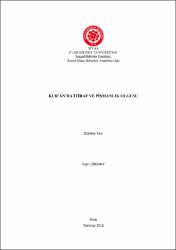| dc.contributor.advisor | Özdeş, Talip | |
| dc.contributor.author | Erenay, Hayri | |
| dc.date.accessioned | 2020-02-27T09:11:43Z | |
| dc.date.available | 2020-02-27T09:11:43Z | |
| dc.date.issued | 2018 | tr |
| dc.date.submitted | 2018-07-04 | |
| dc.identifier.other | XI, 241 sayfa | |
| dc.identifier.uri | https://hdl.handle.net/20.500.12418/12309 | |
| dc.description.abstract | Başta peygamberler olmak üzere, insanlıkla iç içe olan bu olgu, her insanın mutlaka yaşayacağı ve kendisinden müstağni olamayacağı bir hakikat olarak karşımıza çıkmaktadır. Zaten imtihan için yaratılan ve yaratılışında iyilik ve kötülük yapabilme kâbiliyeti olan insan için önemli olan; bu olguyu yaşadıktan sonra, başta peygamberler olmak üzere vahiy terbiyesinden geçen salih kulların gösterdiği tarzda bir tavır geliştirip, ebedi hüsrana uğramamaktır.
Peygamberler ve salih kullar bu olguyu yaşamalarına neden olacak bir olayla karşılaştıklarında; önce itirafı, sonra içselleştirilmiş bir pişmanlık ve tövbe ortaya koymuşlardır.
Kâfir ve inkârcılar ise, tövbe ve af perdesinin kapandığı son nefeste ya da mahşer gününde bu olguyu yaşayacaklardır. Yaşayacakları bu pişmanlık ise, onları ebedi hüsrandan kurtaramayacak ve onlara bir yarar sağlamayacaktır.
Pişmanlık, her zaman bir günah ve hata sonucu yaşanmamaktadır. Bazen, iyi niyetle ve tüm tedbirleri alınarak başlanan işin sonucu hedeflenenin tam tersi sonuçlanabilmektedir. İşte bu gibi durumlarda da, insan başlarken verdiği kararından dolayı pişman olmaktadır.
Kur’ân’da yer alan pişmanlıklar, muhâtablara daha önce benzeri durumlarla karşılaşan enbiyanın ve ebrarın ortaya koyduğu davranışı geliştirmeyi tavsiye etmektedir. Böylece insan yaşadığı derû çöküntüyü, tövbe ile ebedi mutluluk fırsatına dönüştürmüş olmaktadır. | tr |
| dc.description.abstract | Repentance is a phenomenon that is intertwined with mankind and especially the prophets. Repentance is a truth that every human encounter in their life. Mankind was borned to test by the God. In the creation of humankind, people have the ability to make good and evil. The human who was created for testing after using the ability to do evil, they can regret. After this situation, if they develop an attitude like particularly demonstrated by the prophets. They do not face eternal frustration.
When the prophets and the righteous servants faced with an event that will cause them to live this phenomenon.
They revealed firstly confession after an internalized repentance and remorse. The infidels and unbelievers will experience this event in in the last breath of the closing of the curtain of forgiveness and repantance or the day of judgment. This regret will not save them from eternal frustration and it will not be a benefit to them. The regrets which are located in the Quran recommend ebrar's and prophets faced with similar situation for people. Thus, people will be transformed internal collapse experienced by their regrets to opportunity of eternal happiness. | tr |
| dc.language.iso | tur | tr |
| dc.publisher | Sivas Cumhuriyet Üniversitesi - Sosyal Bilimler Enstitüsü | tr |
| dc.rights | info:eu-repo/semantics/openAccess | tr |
| dc.subject | Kur’ân | tr |
| dc.subject | İlim | tr |
| dc.subject | Tefsir | tr |
| dc.subject | Hadis | tr |
| dc.subject | Rivayet | tr |
| dc.subject | İtiraf | tr |
| dc.subject | Pişmanlık | tr |
| dc.title | Kur'ân'da İtiraf ve Pişmanlık Olgusu | tr |
| dc.type | doctoralThesis | tr |
| dc.contributor.department | Sosyal Bilimler Enstitüsü | tr |
| dc.relation.publicationcategory | Tez | tr |















